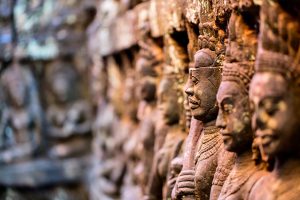A recent report by Amnesty International, detailing the forced evictions of up to 10,000 families at the Angkor temples in Cambodia, shows that the country’s post-Khmer Rouge tradition of land grabs at the expense of the poor is alive and well.
According to the report, which was published last month, Cambodian authorities in the second half of 2022 began evicting large numbers of people from Angkor, ostensibly to protect the location’s UNESCO World Heritage status. Many of these people have lived in the Angkor area for generations.
The authorities characterize the evictions as “voluntary,” but Amnesty interviewed over 100 evictees who say they were given small empty plots of land at a relocation site and told to build their own homes with sheets of corrugated iron.
A small cash payment of a few hundred dollars allowed the authorities to misrepresent their departures as voluntary. Many families ended up living under tarpaulin sheets for months and the relocation area was found to lack adequate sanitation. The area also lacks a proper drainage system and heavy rains led to makeshift homes being destroyed in June.
Human rights treaties to which Cambodia is a signatory stipulate the right to adequate housing. Failure to fulfill this is a violation of human rights. “If UNESCO is committed to putting human rights at the heart of all its actions then it should unequivocally condemn forced evictions as a tool for the management of a World Heritage Site, use its influence to demand that Cambodia’s government stop them, and push for a public and independent inquiry,” said Montse Ferrer, deputy regional director for research at Amnesty International.
Cambodia has lacked a clear and consistent system of land rights since the Khmer Rouge regime, which ruled between 1975 and early 1979 and abolished all private property. Hard property rights today exist only for the elite and those with political connections, while property rights for the bulk of the population can be rescinded whenever convenient. International donors to Cambodia need to understand that the Angkor episode is the latest in a long series of evictions, which are often carried out by companies with close ties to Prime Minister Hun Manet’s family.
The treatment of the Boeung Kak Lake community in Phnom Penh, displaced to make way for real-estate development beginning in 2008, is just one of the most flagrant examples. Fatal violence in the past has been used to clear away residents judged to be obstructing tourist development. On November 15, 2007, two people were shot dead by security forces during a forced eviction near the Preah Vihear temple complex in northern Cambodia.
At Angkor Wat, the governments of France and Japan have a particular responsibility as they are the co-chairs of the International Coordinating Committee for the Safeguarding and Development of the Historic Site of Angkor (ICC Angkor).
France in particular has so far seemed to be unaware of the issues, and announced support for ICC Angkor for a further 10 years at a UNESCO conference in November attended by the Cambodian king Norodom Sihamoni. The king was invited by French President Emmanuel Macron and received at the Elysée Palace. The conference also heard misinformation from Hang Peou, the director-general of the APSARA authority, which administers the temples, who falsely stated that the people removed from Angkor had settled there illegally.
We urge France and Japan to suspend further support for APSARA until a fair and just compensation to the affected families is made according to the law.
We further urge UNESCO and international donors to take urgent action in the light of these findings. Immediate action is needed to provide adequate housing and sanitation for those who have been relocated and to ensure that children are protected from dropping out of school at the relocation site.
The Amnesty report should be unequivocally endorsed by UNESCO. If this is not done, UNESCO needs to say why and to carry out its own investigation. In no circumstances should an investigation by the Cambodian government, which has a long track record of abusing land rights for the benefit of the ruling elite, be accepted.
No proper mechanism for the safeguarding of a major heritage site can be realized, or sustained, without the effective participation of the communities who live on the site. Donors for Angkor development should suspend their support until the government halts relocations and provides a transparent plan for the future of the site. Any relocations must be based on verifiable assurances that families are guaranteed completed housing, proper drainage and sanitation, ways of earning incomes, capital for their businesses, and the means to pay off their debts.

































